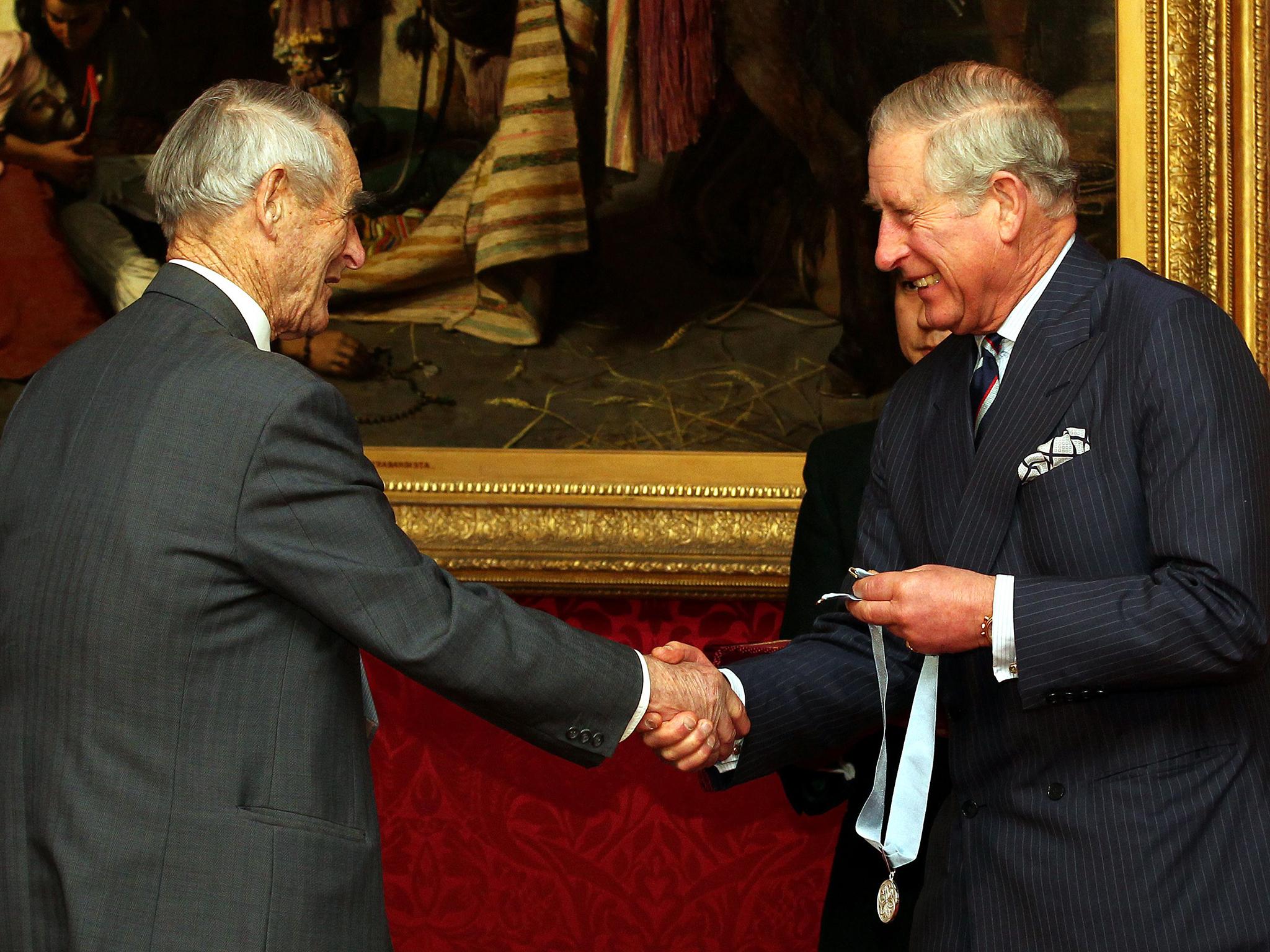The Independent's journalism is supported by our readers. When you purchase through links on our site, we may earn commission.
Sir Gerald Elliot: Scottish industrialist who helped set off the Falklands War with Argentine scrap deal
He was the last of the Salvesen clan to serve the transportation company of the same name that was a giant of its time

Among the movers and shakers of Scotland over the span of the second half of the 20th century, Gerald Elliot would on any reckoning be in the top 10.
Elliot, who has died aged 94, spent his working life at Edinburgh’s Christian Salvesen, the company named after his great-grandfather – the Norwegian businessman who in 1872 who set up what was then a whaling company.
His descent from Christian Salvesen was though his mother Magda, and his cousin Sir Maxwell Harper Gow – commando and Lord Lovat’s staff captain in Normandy on D-Day – took over as chair of the business when Elliot retired in 1988.
Elliot started off in 1948 as “bag carrier” to his uncle Captain Harold Salvesen.
Having read philosophy, politics and economics at Oxford, he was deputy chairman at the firm 1973 to 1981, and then chairman until 1988. During that time, any driver on a motorway would be familiar with the ever bigger Salvesen lorries transporting goods across Britain and the Continent.
On a never-to-be-forgotten occasion, I was present when an old Labour Edinburgh politician, knowing that Gerald Elliot was a millionaire 50 times over, said jocularly: “Gerald, what do you know about Marxism and Communism?”
Came the gentle, soft-spoken reply: “For three years I was supervised by a man who wrote one of the most significant books on Karl Marx – Isaiah Berlin, Fellow of New College, Oxford.
When I interviewed Berlin years later, Berlin said: “How’s my pupil and friend Gerald Elliot, whom you must know in Edinburgh, doing? A clever and agreeable gentleman.”
The philosopher assumed that everyone in Edinburgh knew Elliot – and his assumption was quite right.
Interrupted in his degree by the Second World War, Elliot served with the field force of the Indian Army between 1942 and 1946, in the course of which he learnt fluent Urdu. Half a century later, he spent part of his retirement learning Persian and Arabic as a matter of interest and personal challenge.
In 1948 he joined the family firm cooperating closely with his cousin Sir Maxwell Harper Gow. Elliot was to write the fascinating book, A Whaling Enterprise. The first chapter starts: “This is the chronicle of the grandeur, decline, and eventual extinction of the Antarctic whaling industry. It is linked with the fortunes of the Norwegian-Scottish company Christian Salvesen, for half a century one of the leading venturers in Antarctic whaling and closely concerned in the international struggles, eventually fruitless, to preserve the Antarctic whale stock, and save the industry.”
Elliot, while proud of the courage of the whalers, was instrumental along with his cousin Harper Gow in diversifying Salvesen into the great international firm that it became, because he was a conservationist and understood that whaling sooner rather than later would have to come to an end.
In his younger days Elliot was very familiar with the South Atlantic, not least the two disused whaling stations on the Falkland Islands which were sold to an Argentine scrap dealer called Constantino Davidoff. The transaction indirectly triggered the 1982 war.
For 20 years he remained silent on the subject. Davidoff had trouble transporting the scrap, he told The Scotsman in 2002. “He got pretty desperate so he went to the Argentine government and they evidently decided this was a great opportunity to go into South Georgia, at the same time as they were planning the attack on South Falkland.”
When Davidoff’s party arrived it was aboard an Argentine warship.
In Edinburgh, Elliot served on numerous committees. He was chairman of the Forth Ports Authority from 1973 to 1979; and as MP for the south bank of the Forth I knew what a force he was for innovation and the modernisation of both Leith and Grangemouth.
As chairman of the Scottish Arts Council form 1980 to 1986 he supported the Edinburgh International Festival in difficult times and was immensely helpful to its successive directors of the festival. One of Elliot’s particular interests was Scottish Opera where he was chairman between 1987 and 1992. It is no exaggeration to say that had it not been for his personal generosity Scottish Opera would simply have ceased to exist.
Elliot was one of Edinburgh University’s most important supporters. The Binks Trust, the Elliot family’s charitable trust, made grants of seven figures to a range of projects including African studies, the Centre for Theology and Public Issues.
As chairman of the Edinburgh University Court I was told by those who had long memories and experience that Gerald Elliot was one of its most useful ever lay members.
As president of the University of Edinburgh Development Trust and chairman of the board of trustees of the David Hume Institute, he was able to assist the university in branching out to new areas of scholarship.
The extensions which have been such a success for the National Museum of Scotland originate during the time of Elliot’s chairmanship.
It was a matter of some good-natured mirth that Elliot, who was secretary of the National Whaling Board 1953 to 1962, should in 1950 have married Margaret Ruth Whale the daughter of the Rev John Whale and sister of the distinguished religious correspondent of the Sunday Times and the BBC. Theirs was a quite outstandingly successful partnership.
Gerald Henry Elliot, businessman, born 23 December 1923, died 28 January 2018
The writer of this updated obituary, Tam Dalyell, died last year
Join our commenting forum
Join thought-provoking conversations, follow other Independent readers and see their replies
Comments